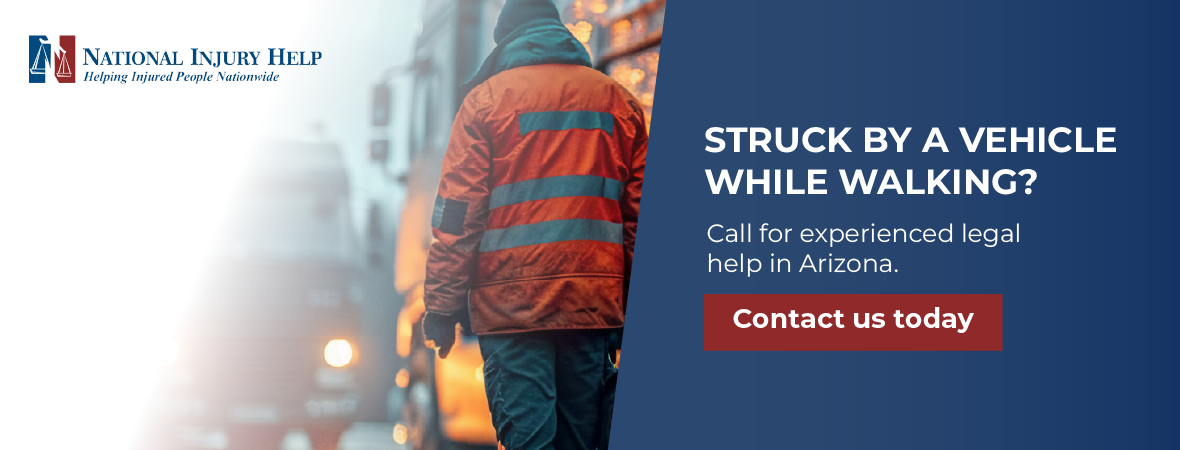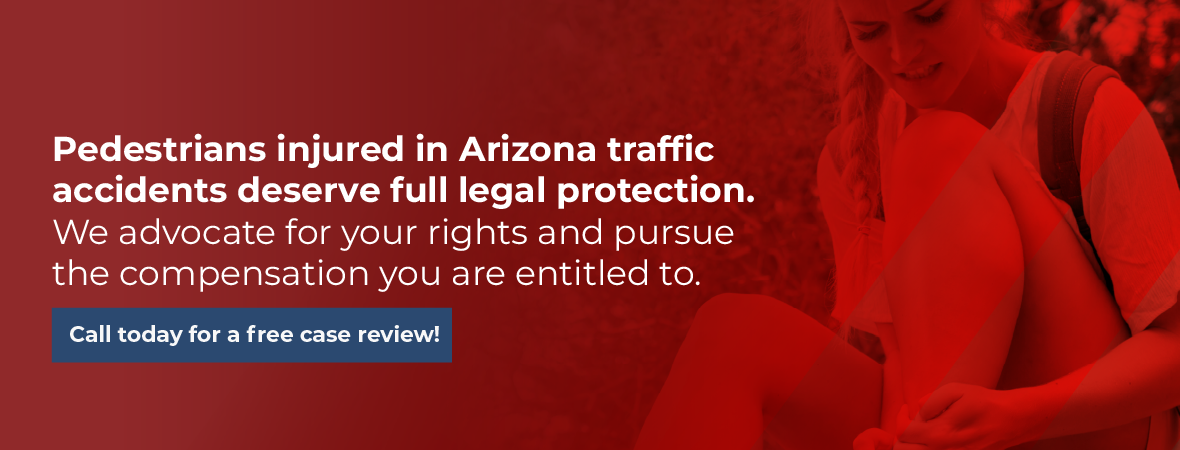Don’t let insurance companies undervalue your pain, your losses, or your future. Contact National Injury Help today to explore your legal options for pedestrian accidents in Arizona and take control of your recovery journey.
Pedestrians have a right to feel safe while walking along Arizona’s roads, crosswalks, and sidewalks. Unfortunately, far too many people are injured each year by negligent drivers who fail to yield, speed through intersections, or drive while distracted.
Whether the crash happens in downtown Phoenix near Roosevelt Row or on Tucson’s Broadway Boulevard, pedestrian accidents often result in devastating injuries that impact every aspect of a person’s life.
Understanding the legal rights of injured pedestrians in Arizona is essential for protecting your future and pursuing the compensation you deserve.
Right to Use Roads and Crosswalks Safely
Arizona law grants pedestrians specific rights when sharing the road with motor vehicles. These rights are designed to keep foot traffic safe and ensure drivers are held accountable when they violate traffic laws. For instance, pedestrians in marked crosswalks always have the right of way when the pedestrian signal is in their favor.
Drivers are required to yield to pedestrians:
- In marked and unmarked crosswalks at intersections
- When a pedestrian is halfway across the road and clearly visible
- In school zones and residential neighborhoods with high foot traffic
Failing to yield is not just dangerous, it’s illegal. Suppose a driver hits someone crossing the street at Mill Avenue and University Drive in Tempe or near the Arizona State Capitol in Phoenix. In that case, they may be found negligent under Arizona traffic laws.
What to Do After a Pedestrian Accident
If you’re hit by a vehicle, your actions in the moments and days following the crash can significantly impact your ability to seek compensation. Even if you believe your injuries are minor, seeking medical attention is a top priority. Next, gather evidence and document the scene whenever possible.
Here’s what to do after a pedestrian accident in Arizona:
- Call 911 and report the crash to law enforcement
- Request medical attention, even for seemingly minor injuries
- Take photos of the scene, your injuries, and the vehicle involved
- Collect contact information from witnesses
- Avoid speaking with insurance adjusters without legal representation
Once your immediate medical needs are addressed, contacting an Arizona pedestrian accident lawyer can help ensure your legal rights are protected from the start.
Pedestrian Rights in Arizona: Understanding the Law
Arizona law recognizes that pedestrians are especially vulnerable in accidents involving motor vehicles. As a result, pedestrian rights in Arizona are supported by statutes designed to enhance safety and ensure fair compensation when those rights are violated.
Pedestrians have the right to:
- Cross at intersections, with or without marked crosswalks, when it’s safe to do so
- Be free from vehicles entering sidewalks or driveways without yielding
- Receive reasonable care from drivers under the “duty of care” legal standard
In locations like Old Town Scottsdale or Tucson’s Fourth Avenue shopping district, drivers are expected to be especially cautious due to high pedestrian density. When motorists fail to meet their legal obligations, injured pedestrians can pursue claims for damages.
Common Causes of Pedestrian Accidents in Arizona
Many pedestrian accidents are preventable and caused by driver negligence. Some of the most common causes include:
- Distracted Driving: Drivers using phones or onboard technology may not see pedestrians in time to stop.
- Failure to Yield: Ignoring crosswalks or pedestrian signals is a frequent cause of crashes at busy intersections like Thomas Road and 44th Street in Phoenix.
- Speeding and Reckless Driving: Excessive speed reduces reaction time and increases injury severity.
- Impaired Driving: Alcohol or drug impairment often plays a role in pedestrian accidents, especially during evening hours.
While drivers are typically at fault, other factors, such as poor street lighting, defective signals, or obscured signs, can also contribute to accidents. In such cases, municipalities or third parties may share liability.
Pedestrian Injury Compensation: What You Can Recover
Injured pedestrians may be entitled to recover various forms of compensation under Arizona law. These damages are intended to cover both financial losses and the physical and emotional toll of the accident.
Types of pedestrian injury compensation may include:
- Medical expenses: Emergency care, surgery, physical therapy, and long-term treatment
- Lost wages: Time missed from work during recovery
- Loss of earning capacity: Inability to return to your previous job or earn the same income
- Pain and suffering: Physical pain, emotional distress, and trauma
- Permanent disability or disfigurement: Compensation for lifelong limitations or visible injuries
In fatal pedestrian accident cases, the surviving family may also pursue wrongful death damages, including funeral costs, loss of companionship, and future income loss.
Legal Options for Pedestrians in Arizona
Pedestrian accident victims have several legal avenues available depending on the circumstances of the crash. An experienced attorney can help you evaluate your options and take the right steps based on your specific situation.
Legal options for pedestrians in Arizona may include:
- Filing a personal injury claim: This allows victims to seek compensation from the at-fault driver’s insurance.
- Filing a lawsuit: If a fair settlement cannot be reached, litigation may be necessary to recover full damages.
- Pursuing third-party claims: If poor road design or malfunctioning signals played a role, a claim against a municipality or contractor may be possible.
- Uninsured or underinsured motorist coverage: If the driver has no insurance or insufficient coverage, your own auto policy may help, even if you weren’t driving.
Each case is different, and the right legal strategy depends on factors like the severity of your injuries, who was at fault, and the availability of insurance coverage. Consulting a lawyer as early as possible can help you avoid missteps and maximize your compensation.
Comparative Fault in Arizona Pedestrian Accidents
Arizona follows a comparative fault system, which means that even if you were partially to blame for the accident, you may still recover compensation. However, your total award will be reduced by your percentage of fault.
For example, if you were distracted while crossing and found to be 20% at fault, and your total damages amounted to $100,000, your compensation would be reduced to $80,000. Insurance companies may try to use comparative fault to minimize payouts, which is why having legal representation is so important.
Protecting Your Rights After a Pedestrian Accident
Every pedestrian has the right to seek justice after being struck by a vehicle. However, asserting those rights takes knowledge, resources, and the willingness to stand up to insurance companies that often prioritize their bottom line. With an attorney’s help, you can build a strong case, understand your options, and hold negligent parties accountable for their actions.
From crosswalk collisions near Chase Field to hit-and-runs along Oracle Road in Tucson, pedestrian accident victims across Arizona face serious risks, but they also have powerful legal protections. Asserting your rights can mean the difference between struggling through recovery alone or having the financial support you need to heal.
Frequently Asked Questions: Pedestrian Accident Rights in Arizona
What are my rights as a pedestrian in Arizona?
Arizona law grants you specific rights for your safety. You have the right of way in marked and unmarked crosswalks at intersections when the signal is in your favor. Drivers are required to yield to you when you are halfway across the road and clearly visible, as well as in school zones and residential areas.
What should I do immediately after being hit by a car in Arizona?
Your health is the top priority. Call 911 to report the crash and request medical attention, even for minor injuries. If you are able, take photos of the scene, your injuries, and the vehicle involved. Collect contact information from any witnesses. Avoid speaking with insurance adjusters before consulting with a lawyer.
Who is usually at fault in an Arizona pedestrian accident?
Most pedestrian accidents are caused by driver negligence, such as distracted driving, failure to yield at crosswalks, speeding, reckless driving, or impaired driving. However, other factors like poor street lighting or defective traffic signals can also contribute, potentially making a municipality or third party partially liable.
Can I still get compensation if I was partially at fault for the accident?
Yes. Arizona follows a “comparative fault” system. This means that even if you were partially to blame (for example, if you were distracted while crossing), you can still recover compensation. Your total award will be reduced by your percentage of fault.
What kind of compensation can I recover after a pedestrian accident in Arizona?
You may be entitled to compensation for medical expenses (emergency care, surgery, therapy), lost wages, loss of future earning capacity, and for the physical and emotional impact of your injuries, such as pain and suffering, permanent disability, or disfigurement.
What are my legal options if the driver who hit me is uninsured?
If the at-fault driver has no insurance or not enough insurance, you may be able to file a claim under your own auto insurance policy’s uninsured/underinsured motorist (UM/UIM) coverage. This applies even though you were a pedestrian at the time of the accident.
Should I talk to the insurance company after my accident?
It is strongly recommended that you avoid giving detailed statements or accepting a settlement offer from an insurance adjuster without first speaking to an attorney. Insurance companies often aim to minimize payouts, and an attorney can protect your rights and help you pursue the full compensation you deserve.
How long do I have to file a pedestrian accident lawsuit in Arizona?
Arizona has a statute of limitations, which is a strict deadline for filing a lawsuit. For personal injury cases, including pedestrian accidents, this is typically two years from the date of the accident. It is crucial to act promptly to protect your legal rights.
What if the accident was caused by a poorly designed crosswalk or a broken traffic signal?
In some cases, a city or contractor may share liability for an accident if dangerous road conditions contributed to the crash. These claims against government entities have specific rules and shorter deadlines, so it is essential to consult with a lawyer who understands these complex cases.
Why should I contact a pedestrian accident lawyer?
An experienced lawyer can handle all communications with insurance companies, investigate the accident to determine all liable parties, calculate the full value of your claim, and fight for the compensation you need for your recovery. Most offer free consultations and work on a contingency fee basis, meaning you pay no fees unless they win your case.
Contact an Arizona Pedestrian Accident Lawyer Today
If you’ve been injured in a pedestrian accident anywhere in Arizona, it’s time to take the next step toward justice. Contact National Injury Help at 1 (800) 214-1010 to speak with an experienced team of Arizona pedestrian accident lawyers who can help you understand your legal rights and pursue the pedestrian injury compensation you deserve.
From Phoenix to Tucson, we’re here to fight for your recovery and hold negligent drivers accountable. Your consultation is free, and there’s no fee unless we win your case.








